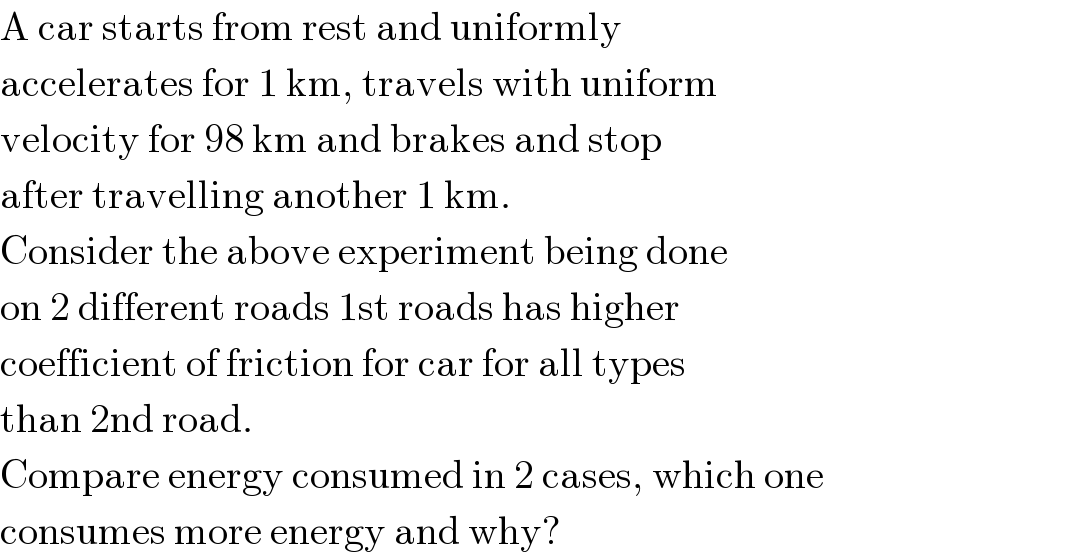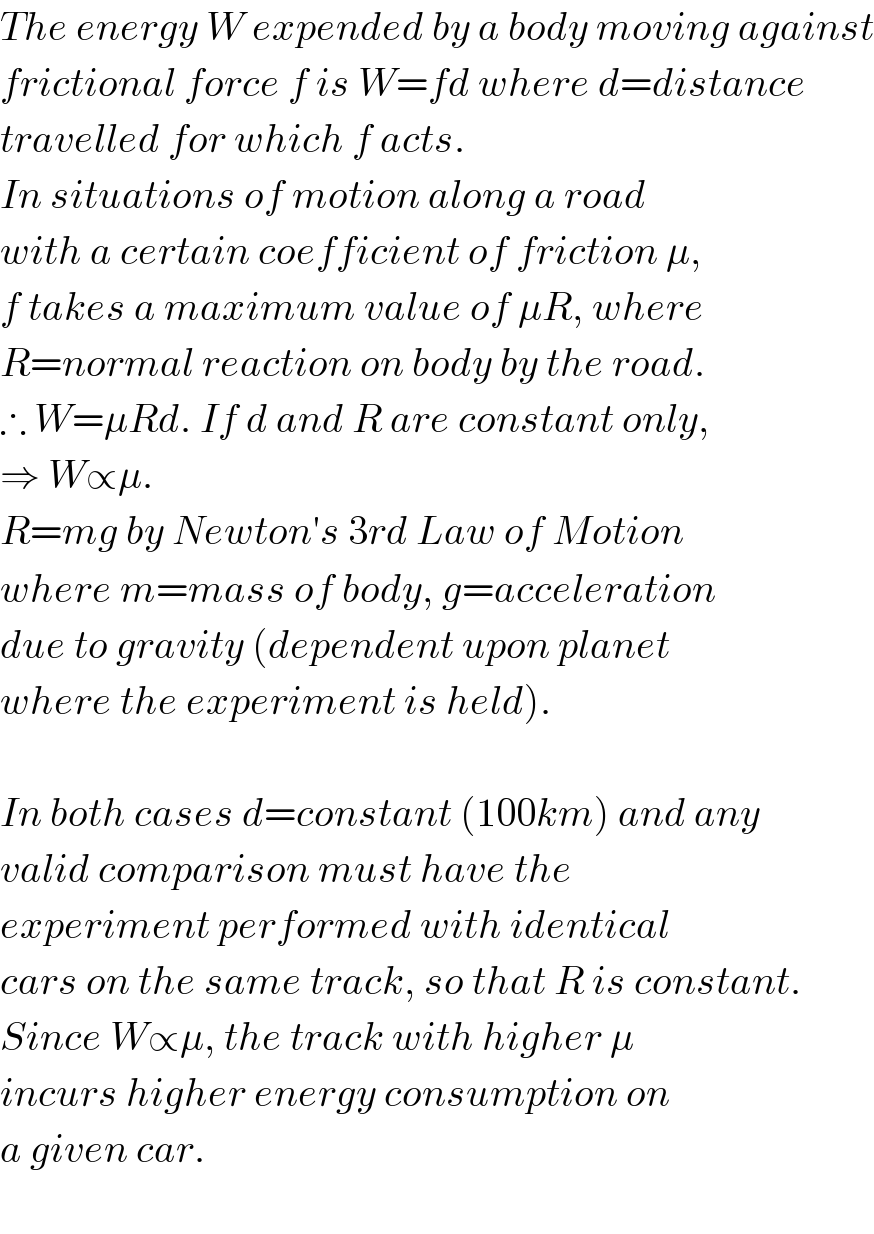
Question Number 3463 by prakash jain last updated on 13/Dec/15

$$\mathrm{A}\:\mathrm{car}\:\mathrm{starts}\:\mathrm{from}\:\mathrm{rest}\:\mathrm{and}\:\mathrm{uniformly} \\ $$$$\mathrm{accelerates}\:\mathrm{for}\:\mathrm{1}\:\mathrm{km},\:\mathrm{travels}\:\mathrm{with}\:\mathrm{uniform} \\ $$$$\mathrm{velocity}\:\mathrm{for}\:\mathrm{98}\:\mathrm{km}\:\mathrm{and}\:\mathrm{brakes}\:\mathrm{and}\:\mathrm{stop} \\ $$$$\mathrm{after}\:\mathrm{travelling}\:\mathrm{another}\:\mathrm{1}\:\mathrm{km}. \\ $$$$\mathrm{Consider}\:\mathrm{the}\:\mathrm{above}\:\mathrm{experiment}\:\mathrm{being}\:\mathrm{done} \\ $$$$\mathrm{on}\:\mathrm{2}\:\mathrm{different}\:\mathrm{roads}\:\mathrm{1st}\:\mathrm{roads}\:\mathrm{has}\:\mathrm{higher} \\ $$$$\mathrm{coefficient}\:\mathrm{of}\:\mathrm{friction}\:\mathrm{for}\:\mathrm{car}\:\mathrm{for}\:\mathrm{all}\:\mathrm{types} \\ $$$$\mathrm{than}\:\mathrm{2nd}\:\mathrm{road}. \\ $$$$\mathrm{Compare}\:\mathrm{energy}\:\mathrm{consumed}\:\mathrm{in}\:\mathrm{2}\:\mathrm{cases},\:\mathrm{which}\:\mathrm{one} \\ $$$$\mathrm{consumes}\:\mathrm{more}\:\mathrm{energy}\:\mathrm{and}\:\mathrm{why}? \\ $$
Commented by prakash jain last updated on 13/Dec/15

$$\mathrm{Same}\:\mathrm{car}\:\mathrm{is}\:\mathrm{used}\:\mathrm{on}\:\mathrm{both}\:\mathrm{tracks}.\:\mathrm{All}\:\mathrm{other} \\ $$$$\mathrm{things}\:\mathrm{equal}\:\mathrm{only}\:\mathrm{friction}\:\mathrm{changes}. \\ $$
Answered by Yozzii last updated on 13/Dec/15

$${The}\:{energy}\:{W}\:{expended}\:{by}\:{a}\:{body}\:{moving}\:{against} \\ $$$${frictional}\:{force}\:{f}\:{is}\:{W}={fd}\:{where}\:{d}={distance} \\ $$$${travelled}\:{for}\:{which}\:{f}\:{acts}. \\ $$$${In}\:{situations}\:{of}\:{motion}\:{along}\:{a}\:{road} \\ $$$${with}\:{a}\:{certain}\:{coefficient}\:{of}\:{friction}\:\mu, \\ $$$${f}\:{takes}\:{a}\:{maximum}\:{value}\:{of}\:\mu{R},\:{where} \\ $$$${R}={normal}\:{reaction}\:{on}\:{body}\:{by}\:{the}\:{road}. \\ $$$$\therefore\:{W}=\mu{Rd}.\:{If}\:{d}\:{and}\:{R}\:{are}\:{constant}\:{only}, \\ $$$$\Rightarrow\:{W}\propto\mu.\: \\ $$$${R}={mg}\:{by}\:{Newton}'{s}\:\mathrm{3}{rd}\:{Law}\:{of}\:{Motion} \\ $$$${where}\:{m}={mass}\:{of}\:{body},\:{g}={acceleration} \\ $$$${due}\:{to}\:{gravity}\:\left({dependent}\:{upon}\:{planet}\right. \\ $$$$\left.{where}\:{the}\:{experiment}\:{is}\:{held}\right). \\ $$$$ \\ $$$${In}\:{both}\:{cases}\:{d}={constant}\:\left(\mathrm{100}{km}\right)\:{and}\:{any} \\ $$$${valid}\:{comparison}\:{must}\:{have}\:{the}\: \\ $$$${experiment}\:{performed}\:{with}\:{identical} \\ $$$${cars}\:{on}\:{the}\:{same}\:{track},\:{so}\:{that}\:{R}\:{is}\:{constant}. \\ $$$${Since}\:{W}\propto\mu,\:{the}\:{track}\:{with}\:{higher}\:\mu \\ $$$${incurs}\:{higher}\:{energy}\:{consumption}\:{on} \\ $$$${a}\:{given}\:{car}.\: \\ $$$$ \\ $$
